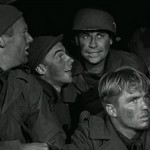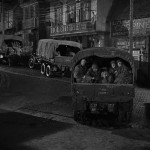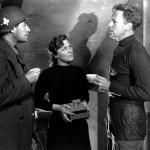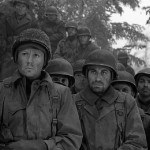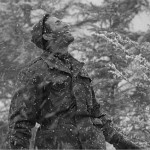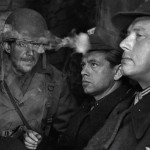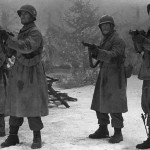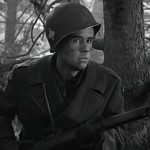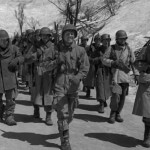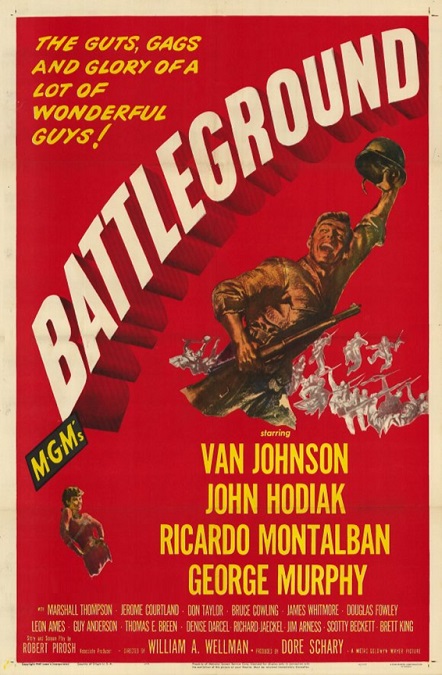
Battleground – 1949
Here we have the first real example of a war film after the end of WWII. It also had the significance of a film that portrayed American soldiers as flawed and human. I’ll say that it was a good movie, despite the fact that I am generally not a fan of war movies.
Still, about the only thing I didn’t like was the fact that for half the film, I didn’t know who any of the characters were. I recognized faces and what personalities went along with them, but that was about it. They didn’t do much to introduce any of them. But after a while, the names didn’t seem to matter much.
The film follows a group of men in the war, in France, who are members of the 101st Airborne Division, who are defending the town of Bastogne. They are out-manned, out-gunned, and running low on food and provisions, but they refuse to give up. Many friends and fellows are killed, but the brave heroes struggle on through a winter of bitter cold and snow to defend the strategically located town.
The film covers the Siege of Bastogne during the Battle of the Bulge. There were many men in their company, but there were six main characters which the story follows. The Squad Leader is Holly, played by Van Johnson. His partner is the new kid, Jim Layton, played by Marshall Thompson. Other members of the squad are Jarvess, played by John Hodiak. He is smart and speaks both French and German. The man waiting for his orders to be sent home is “Pop” Stazak, played by George Murphy. Kinny, who is constantly spitting chewing tobacco, is wonderfully played by James Whitmore. And finally, Douglas Fowley plays “Kipp” Kippton, the guy with the false teeth.
These six characters were all very well written, each with their own personalities, their own good points and bad. The plot was extremely character driven, so a lot of time and care was given to developing them. The incredible hardships that the men were forced to endure on the big screen, made me feel for them. Add to that the fact that the actors all did a fantastic job, and I became emotionally invested in the story.
For example, the character of Layton started out as a green recruit, while the other men were all seasoned soldiers. But over the course of the film, he dug trenches, took part in life threatening battles, and watched friends die. His skin grew thicker, as his attitude became calmer. Thompson, did a wonderful job of showing the transformation, so that I actually gained a measure of respect for both the character and the actor.
But for me, and apparently for the Academy as well, the stand-out was James Whitmore, playing the role of Kinnie. He really looked like he embodied the soul of the American soldier. His character suffered along with everyone else, and yet his spirit never seemed to break. In the end of the film, it was he who rallied the squad one last time to leave the field of battle with their heads held high. Whitmore was nominated for Best Supporting Actor for his portrayal, though he did not win. However, he did win a Golden Globe for the role.
The story was certainly inspirational. There were acts of heroism to lift the spirit performed by American soldiers set against impossible odds. Sounds a little too Hollywood, custom made for a patriotic public who had recently seen the end of the war, right? Well, think again. Apparently the events that took place in the film were quite accurate with only a few deviations from true history. The biggest example was that of German soldiers posing as American soldiers. To be sure, that did happen during the war, but in another location.
The screenplay was written by Robert Pirosh, who based it on his own experiences during the Battle of the Bulge. The realism of the writing became very evident when nearly every character had his own moment of doubt, of wanting to go home, or even run away from the battle. None of the characters were perfect, and that is what made them so believable. Pirosh won the Academy Award for Best Writing, Story and Screenplay.
One of the small touches I liked was something obvious, when thought about, but it might have been easily missed. The men were on the battlefield, surrounded by German soldiers, surviving out in the open during a harsh winter. The actors all grew beards and just kept getting grungier and dirtier. It made sense, showing the passage of time during the seven day siege.
Again, I’ll say, I am not a huge fan of war films, but I guess if they are done right, I can enjoy them as much as any other genre. And Battleground got it right. Sure, it didn’t take home the Best Picture Oscar, losing to All the King’s Men, but I think maybe it should have won. It was a much more engaging film.
